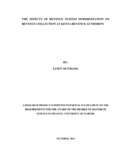| dc.contributor.author | Muthama, Janet. | |
| dc.date.accessioned | 2013-11-21T07:58:37Z | |
| dc.date.available | 2013-11-21T07:58:37Z | |
| dc.date.issued | 2013-10 | |
| dc.identifier.citation | A Research Project Submitted In Partial Fulfillment Of The Requirements For The Award Of The Degree Of Master Of Science In Finance, University Of Nairobi | en |
| dc.identifier.uri | http://erepository.uonbi.ac.ke:8080/xmlui/handle/123456789/59706 | |
| dc.description.abstract | In today’s competitive, fast-paced business landscape, getting the most out of available
resources is not an option but rather a requirement. Organizations are taking a highly
proactive approach to systems modernization and operations in an effort to increase
efficiency and effectiveness in their operations. There is an increasing need by the
government to collect much revenue by way of taxes to face the increasing financial
expenditures budgeted by the country. The objective of the study was to determine the
relationship between system modernization and revenue collection at the Kenya Revenue
Authority in Kenya with regard to the Simba System. This study employed descriptive study
design. The study used secondary data collection. The study utilized KRA Customs data for
four financial years before and after Simba System. The period selected was from July 2001
to June 2009. The data was analyzed using Statistical Package for Social Sciences (SPSS)
and presented in figures and tables.
The study findings established that that the number of transactions and the revenue collected
increased after the implementation compared to the years before the implementation. The
study findings also established that the revenue collected was directly related to number of
transaction but inversely related to inflation, operating costs and exchange rates and that
there was a strong relationship between system modernization and revenue collection at the
Kenya Revenue Authority in Kenya with regard to the Simba System.
From the study it was evident that System modernization enhances Revenue Collection and
thus it should be encouraged. This study recommends that policy makers should ensure that
there is stable equilibrium for the exchange rates as they adversely affect the revenue
collection process. In addition, the policy makers need to evaluate the best exchange rate
policy for optimal economic development. The study further recommends that the policy
makers come up with policies to control the inflation rate in Kenya as it negatively affects
the entire revenue collection process | en |
| dc.language.iso | en | en |
| dc.publisher | University of Nairobi | en |
| dc.title | The effects of revenue system modernization on revenue collection at Kenya Revenue Authority | en |
| dc.type | Thesis | en |
| local.publisher | School of Business | en |


